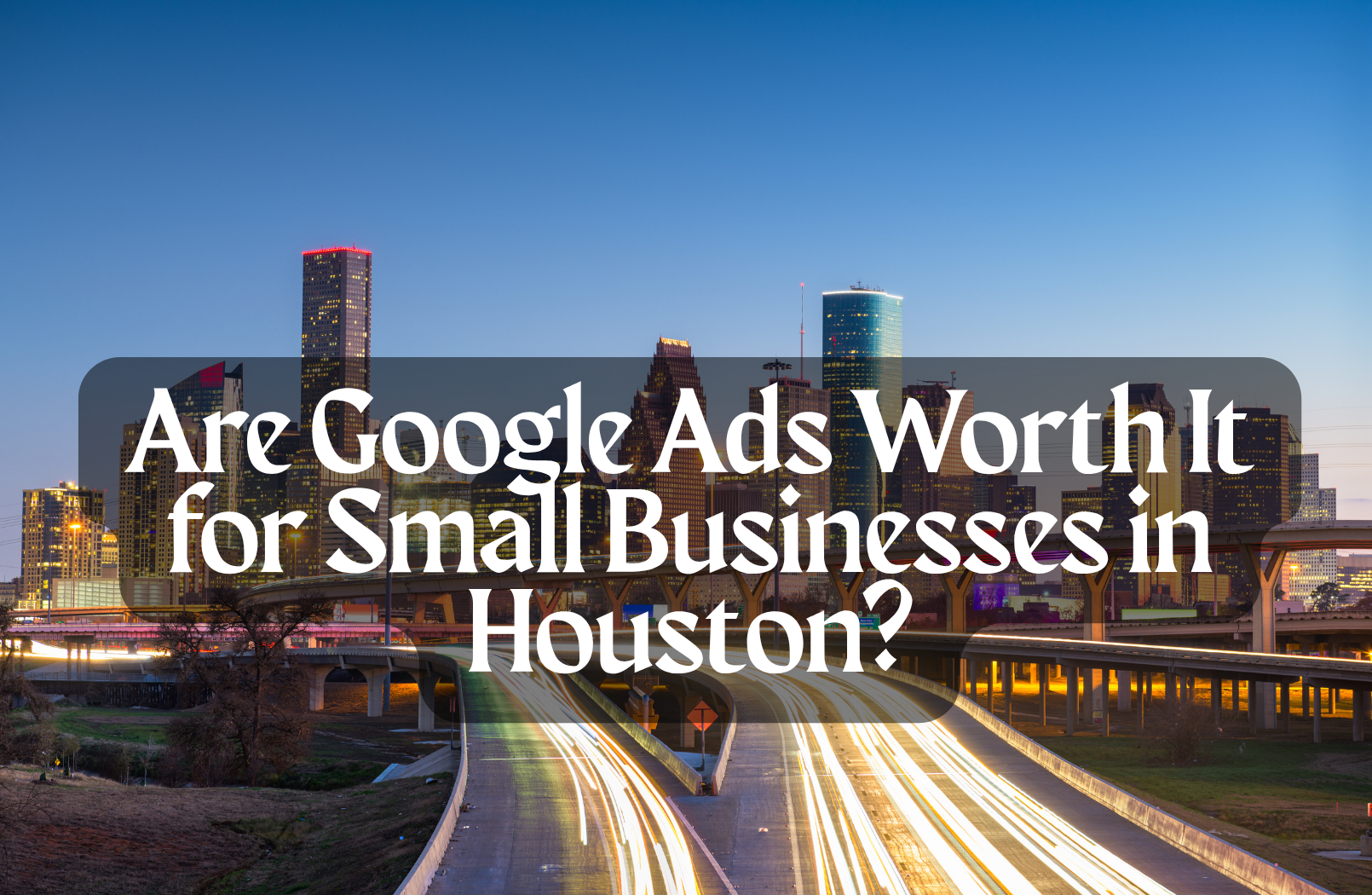Small businesses in Houston face a highly competitive local market, especially in service-based industries like HVAC, legal, home repair, and personal care. To stand out, many are turning to digital advertising — particularly Google Ads. But with limited budgets, owners often ask: are Google Ads actually worth the investment?
Google Ads offers a fast way to appear at the top of search results when potential customers are actively searching. While the platform promises visibility and lead generation, costs can add up quickly — especially in a market as large and competitive as Houston. Understanding the platform’s effectiveness, cost dynamics, and strategic fit is crucial before committing marketing dollars.
Understanding the Local Houston Market
Houston is the fourth-largest city in the U.S., with a diverse population and a wide range of small businesses competing for attention. The metro area has over 2 million households, many of which rely on Google to find local services — whether it’s plumbers, attorneys, realtors, or auto repair shops.
Because of this demand, local search competition is intense. Keywords like “Houston HVAC repair” or “personal injury lawyer Houston” can have dozens of businesses bidding on them daily. This drives up costs but also signals strong buyer intent — when someone searches a local service on Google, they’re often ready to take action.
Houston’s geography also matters. The city spans a large area, and users tend to search with neighborhood-specific terms like “Katy plumbing” or “Galleria area roofing.” This creates opportunities for hyper-local targeting through Google Ads, allowing small businesses to focus budgets on the ZIP codes or regions where they operate.
In short, the Houston market offers high local demand but also steep competition. Success with Google Ads depends on targeting the right local keywords and controlling budget efficiency.
Google Ads: How It Works for Local Businesses
Google Ads operates on a pay-per-click (PPC) model, meaning businesses only pay when someone clicks their ad. For small businesses in Houston, this can be cost-effective — but only if the campaign is well-targeted.
There are two main types of ads most relevant to local service providers:
- Search Ads – These appear at the top of Google search results when users type in queries like “emergency electrician in Houston.” They’re ideal for intent-driven marketing — reaching people who are actively looking for a service.
- Display Ads – These are image or banner ads shown on websites across Google’s network. They’re better for brand awareness than direct leads and less effective for urgent service-based searches.
Local businesses can also use location targeting to narrow down ads by city, ZIP code, or even a set radius around a physical location. This ensures ad spend is focused only on people who can actually become customers.
Another feature that benefits Houston businesses is ad scheduling, which allows you to run ads only during business hours or peak inquiry times — a tactic that can stretch a limited budget.
Ultimately, Google Ads gives small businesses the tools to control where, when, and to whom ads appear — essential in a large, diverse market like Houston.
Cost of Google Ads in Houston
The cost of Google Ads in Houston varies widely depending on the industry, keyword competition, and targeting strategy. Most small service-based businesses in Houston can expect to pay:
- $2 to $7 per click for low to moderately competitive services (e.g., cleaning, pest control, landscaping).
- $10 to $40+ per click for high-competition services like HVAC repair, legal services, and locksmiths.
The average cost-per-click (CPC) in Houston tends to be higher than the national average for many service industries, due to the city’s size and competitive density.
Example monthly ad spend for small businesses in Houston:
- Small campaigns: $300–$1,000/month (tight targeting, limited keywords)
- Moderate campaigns: $1,000–$3,000/month (broader coverage, consistent lead flow)
- Competitive industries: $3,000–$10,000+/month (especially legal, medical, or emergency services)
It’s important to remember that paying for clicks doesn’t guarantee conversions. Without optimized landing pages, clear calls-to-action, and good targeting, high CPCs can drain the budget with little return.
Still, many Houston businesses find success by focusing on long-tail, geo-specific keywords like “24 hour AC repair Katy TX,” which are cheaper and more conversion-focused than broad terms.
Measuring ROI from Google Ads
To determine if Google Ads are worth it, Houston small businesses must focus on Return on Investment (ROI) — not just clicks or impressions. ROI measures how much revenue is generated for every dollar spent on ads.
The basic formula:
ROI = (Revenue from Ads – Cost of Ads) ÷ Cost of Ads
To calculate this accurately, businesses need proper conversion tracking in place. This involves tracking actions like:
- Form submissions
- Phone calls (via call tracking numbers)
- Online bookings or purchases
- Clicks on contact buttons
For example, if a plumbing company in Houston spends $1,000/month on ads and gets 25 leads, and 10 of those turn into jobs averaging $250 each, the return would be $2,500 in revenue — a 150% ROI.
However, ROI depends heavily on:
- Conversion rate (how many clicks turn into leads)
- Close rate (how many leads become paying customers)
- Customer value (one-time job vs. recurring clients)
- Ad quality and relevance
Using Google Analytics and Google Ads conversion tracking, businesses can refine their campaigns over time to increase efficiency and reduce cost-per-lead.
Without proper tracking, it’s almost impossible to judge whether Google Ads are profitable — making ROI the key factor in deciding if the platform is worth it.
Pros and Cons of Google Ads for Houston Small Businesses
Pros
- Immediate Visibility: Google Ads can put your business at the top of search results instantly — valuable in a competitive city like Houston.
- High Buyer Intent: Search ads target users actively looking for services, increasing the chance of conversions.
- Precise Targeting: You can focus ads by ZIP code, radius, keywords, time of day, or even device type — maximizing relevance and reducing waste.
- Budget Control: Set daily or monthly limits, pause ads anytime, and shift budget toward best-performing keywords.
- Scalability: Start small and scale based on performance. If a campaign is profitable, more budget usually means more leads.
Cons
- High Competition in Houston: In industries like law, HVAC, or urgent care, CPCs can be very expensive, requiring strong conversion strategies to break even.
- Steep Learning Curve: Without proper setup or management, it’s easy to waste money on irrelevant clicks or low-converting traffic.
- Ongoing Management Needed: Ads need continuous testing and optimization — Google Ads isn’t a “set it and forget it” platform.
- Click Fraud Risks: In competitive markets, click fraud (competitors clicking your ads) can affect results if not monitored.
- Dependence on Paid Traffic: As soon as the ad spend stops, traffic stops — unlike SEO, which builds over time.
In Houston’s competitive market, the pros can outweigh the cons — but only if campaigns are properly set up, actively managed, and conversion-focused. Check Houston PPC Agency
Alternatives and When Google Ads Might Not Be Worth It
While Google Ads can be effective, there are cases where other strategies may be a better fit — especially for small Houston businesses with limited budgets or longer-term goals.
When Google Ads Might Not Be Worth It:
- Low Budget, High Competition: If you can’t afford $10–$30 per click in a competitive niche, you may burn through your budget with little return.
- No Landing Page or Weak Website: Sending paid traffic to an unoptimized site often leads to wasted spend and low conversions.
- No Time for Ongoing Management: If you can’t monitor and optimize your campaigns regularly, results will suffer quickly.
Effective Alternatives:
- Local SEO: Optimizing your Google Business Profile and website can improve your organic rankings in local searches, driving free traffic over time.
- Social Media Ads: Platforms like Facebook and Instagram offer cheaper CPCs and work well for businesses with visual services or brand-building needs.
- Email Marketing: For businesses with existing customer lists, email remains a high-ROI, low-cost channel.
- Referral Programs: Encouraging word-of-mouth through incentives can drive local growth without advertising costs.
- Community Sponsorships: Local event or school sponsorships can build brand visibility and goodwill in specific neighborhoods.
For some Houston businesses, combining Google Ads with these alternatives produces the best results. But for others — especially those in early stages or with limited margins — organic and grassroots tactics may be more sustainable.
Conclusion
For small businesses in Houston, Google Ads can absolutely be worth it — but only under the right conditions. The platform offers powerful targeting, immediate visibility, and access to high-intent local searchers. However, it also comes with steep competition and rising costs, especially in crowded service sectors.
Success depends on strategic setup, tight budget control, and a clear focus on ROI. Businesses that actively manage campaigns, track conversions, and continuously optimize can see strong returns. But for those with minimal budget or no time for management, alternative strategies like local SEO or social media may offer better value.
In short: Google Ads can work for Houston small businesses — if you have the right plan and execute it carefully.


